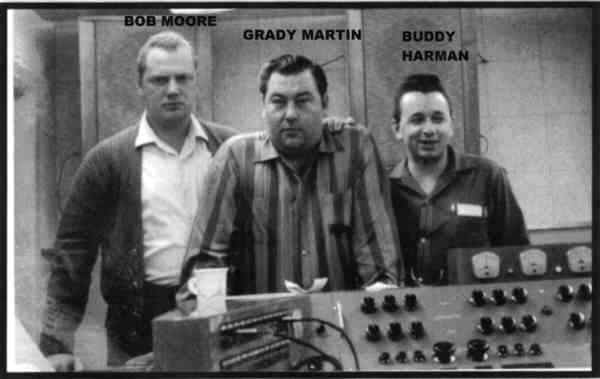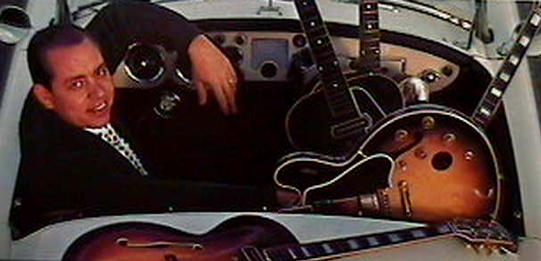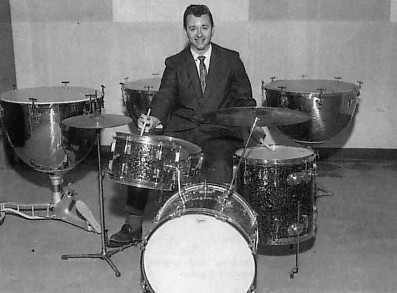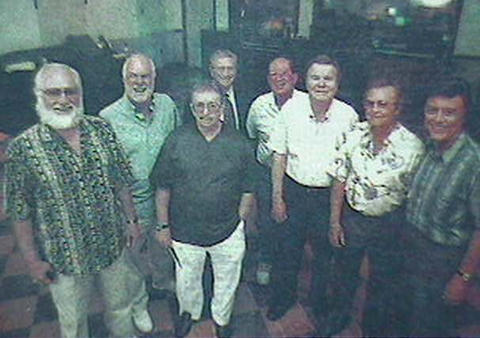
Hall
of Fame to honor Country Music's A
Team
by Wayne Bledsoe
KnoxNews.com
The names of the men known collectively as
The A Team may be unfamiliar, but artists once
came to Nashville from all over the world to
play with them. The A Team was made up of
A-list studio musicians who performed on a
dizzying number of hits during the Nashville
Sound era. Their contributions began in the
1950s, and a few are still recording today.
Elvis Presley recorded with The A Team.
Their ranks include bassist Bob Moore,
guitarists Grady Martin, Hank Garland, Ray
Edenton and Harold Bradley (brother of producer
Owen), drummer Buddy Harman, pianist Hargus
"Pig" Robbins, fiddler Tommy Jackson, steel
guitarist Pete Drake, saxophonist Boots
Randolph, pianist Floyd Cramer and vocal groups
the Jordanaires and the Anita Kerr Singers.
Some members of the A Team will be among those
honored Sunday, March 12, at the North American
Country Music Associations International Hall
of Fame induction ceremony. Many of the
original members of the team will be in
attendance.
"We had absolutely no idea that we were making
history," says Bob Moore of the A-Team's
contributions to music history. "We were just
doing a job."
It was a job the musicians say they loved.
Which is a good thing, because they didn't get
much time off.
"We worked a four-session day five or six days
a week," recalls Gordon Stoker, longtime member
of the Jordanaires (now celebrating its 50th
anniversary).
Guitarist Harold Bradley, credited in Guitar
Player magazine as the most-recorded guitar
player in history, likens those
classics-producing, back-to-back sessions to
being invited to a party at 10 a.m., another at
2 p.m., another at 6 p.m. and yet another at 10
p.m.
"One session would be Elvis Presley, another
would be Patsy Cline, Kitty Wells, George
Beverly Shea ...," recalls Bradley.

Bradley's late brother Owen (along with Chet
Atkins) was one of the architects of what was
called the Nashville Sound. However, Harold is
quick to replace that singular term with a
plural one.
"There were lots of Nashville Sounds," says
Bradley, who became best known for playing the
tic-tac bass that produced one of those
signature sounds.

Another sound that began with the group
included the "fuzz tone" guitar sound that
resulted from Grady Martin playing through a
defective mixing board pre-amp on Marty
Robbins' song "Don't Worry."
Yet the most enduring innovation was not a
sound, but a musical shorthand dubbed "the
numbers system."
Jordanaires member Neal Matthews came up with a
system that assigned numbers to chords and
allowed musicians to transpose keys and learn
new songs quickly. While it was the A Team
players who first utilized the system, it
quickly spread throughout Nashville and beyond.
The A Team components began assembling in 1947
when Castle Studios became Nashville's first
established recording studio.
Chet Atkins became the prolific producer at RCA
Records, while Owen Bradley was the head producer at Decca. The producers sought out musicians who
were highly skilled and highly adaptable.

Many of the musicians had worked the road with
country stars but found that studio work was
more lucrative.
Bradley says the musicians saw each other more
than their families, and it was sometimes
difficult to adjust to their real families on
weekends. However, Stoker says, musicians were
loath to turn down work, fearing they might not
get the next call.
"I loved it, and I still love it," says
Bradley. "It's real high. That was our drug of
choice. It's tremendously exciting."
It was also a musical treadmill.
"The only thing in your mind was to do that
particular song, then go onto the next one,"
says Stoker. "Then you'd walk out of the studio
and not remember one song you did."
Stoker says that by the time Twitty's "Only
Make Believe" was released, 18 months after it
was recorded, he had forgotten that the band
had played on the song.
"I heard it on the radio and said, 'Who is
that? It sounds like us!'" says Stoker.

Hank
Garland
The musicians say there were occasional
squabbles among them, but all had the primary
concern of making a hit record.
"There were no egos about it," says Bradley,
who filled in on a variety of instruments.
"Whoever could play it better was who needed to
do it."
Each musician has his own favorite memories of
working with certain artists.
Bradley has particularly fond memories of Patsy
Cline. He believes he played on all but two of
the singer's sessions.
"'Crazy' was a special session," says Bradley.
"Patsy had just had the automobile accident, so
my brother just kept working on the arrangement
while she couldn't be there. We had to learn
and unlearn and relearn our parts."
Finally, when Cline came in to record, Bradley
says she nailed the song in one take.
"And that's the No. 1 jukebox record of all
time," says Bradley.
He's also particularly proud of Roy Orbison's
"Crying," which begins with Bradley's bass and
Buddy Harman's drums. Orbison and Bradley
became close friends.

Stoker, Moore and Bradley have fond memories of
working with Elvis Presley.
It was Presley who demanded that the
Jordanaires be given credit on his recordings.
At the time, session players never saw their
names on album liner notes, much less singles.
Stoker says Presley was the first artist to
insist that players be given credit on liner
notes.

Moore remembers some hard sessions, such as
when the hard-drinking George Jones would began
a session and then be unable to finish. And
then Perry Como sang so quietly that it was
hard for the musicians not to overpower his
crooning.
While much of the A Team has retired and a few
have died, Stoker, Bradley and Moore are among
those who continue to work in music.
Bradley, who is president of the Nashville
musicians' union, still performs and produces
albums. The Jordanaires continue to be in
demand for concerts and session work. And Moore
is currently working on an album project.

The musicians say they miss the days when
artists and musicians all worked together in
the studio. Now most albums are recorded one
instrument at a time, with musicians rarely
even seeing the singers.
"It was the absolute opportunity of a
lifetime," says Moore. "I ended up spending my
life with the finest musicians on earth. How
fortunate can a poor kid from East Nashville
be?"
"It's amazing," says Bradley. "I was a big band
player, then I made country records and I've
also played with 11 members of the Rock 'n'
Roll Hall of Fame."
"I can imagine how tragic it would be for a man
to work all his life and not have access to
what he did," says Moore. "I can turn on the
car radio, and I can always hear me!"
Sugarfoot Rag MP3


|



